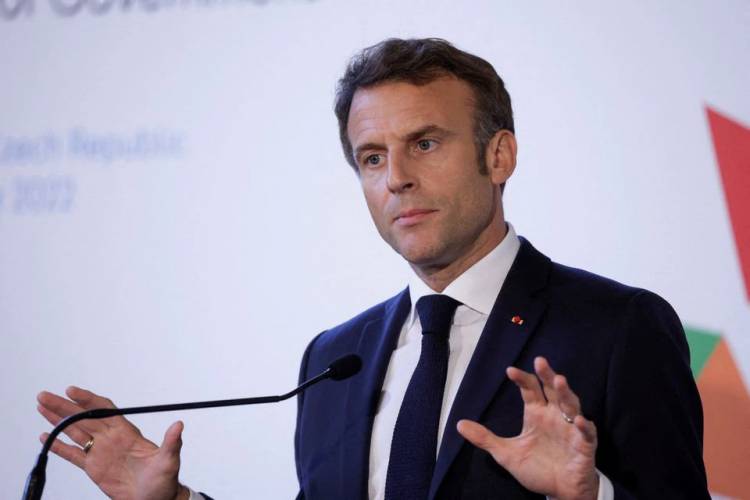France accuses Russia of stoking Armenia, Azerbaijan conflict

PARIS, Oct 12 (Reuters) - France's President Emmanuel Macron accused Russia on Wednesday of purposefully provoking the recent clashes between Armenia and Azerbaijan as part of an effort destabilise the Caucasus region and beyond.
The worst fighting between the two ex-Soviet countries since 2020 broke out in late September, killing more than 200 people.
The fighting is linked to decades-old hostilities over control of the Nagorno-Karabakh region, internationally recognised as part of Azerbaijan, but until 2020 largely controlled by the majority ethnic Armenian population.
Moscow, which has a defence pact with Armenia and a military base there, deployed thousands of peacekeepers to the region after a ceasefire in 2020.
That reaffirmed its role as policeman and chief power broker in the volatile part of the former Soviet Union where Turkey also wields increasing influence thanks to its close alliance with Azerbaijan.
However, speaking to France 2 television on Wednesday Macron said Moscow had stoked tensions in recent months in favour of Azerbaijan.
"What's been happening on the border the last two years ... 5,000 Russian soldiers are allegedly there to guarantee the border, (but) the Russians have used this conflict which dated back several centuries and played Azerbaijan's game with Turkish complicity and came back to weaken Armenia which was once a country it was close to," Macron said.
"You see what's happening? It's an effort by Russia to destabilise. It wants to create disorder in the Caucasus to destabilise all of us."
2 minute readOctober 13, 202212:59 AM GMT+4Last Updated 9 hours ago
France accuses Russia of stoking Armenia, Azerbaijan conflict
Reuters
French President Emmanuel Macron attends a news conference, during the Informal summit of the European Political Community at Prague Castle, in Prague, Czech Republic, October 7, 2022. REUTERS/Leonhard Foeger
PARIS, Oct 12 (Reuters) - France's President Emmanuel Macron accused Russia on Wednesday of purposefully provoking the recent clashes between Armenia and Azerbaijan as part of an effort destabilise the Caucasus region and beyond.
The worst fighting between the two ex-Soviet countries since 2020 broke out in late September, killing more than 200 people.
The fighting is linked to decades-old hostilities over control of the Nagorno-Karabakh region, internationally recognised as part of Azerbaijan, but until 2020 largely controlled by the majority ethnic Armenian population.
Advertisement · Scroll to continue
Moscow, which has a defence pact with Armenia and a military base there, deployed thousands of peacekeepers to the region after a ceasefire in 2020.
That reaffirmed its role as policeman and chief power broker in the volatile part of the former Soviet Union where Turkey also wields increasing influence thanks to its close alliance with Azerbaijan.
However, speaking to France 2 television on Wednesday Macron said Moscow had stoked tensions in recent months in favour of Azerbaijan.
Latest Updates
Russian missiles target more than 40 Ukraine cities, towns
North Korea says it practiced firing cruise missiles able to carry nuclear weapons
When Chinese protesters came up against Xi's security machine
Iranians keep up protests over Mahsa Amini death despite mounting fatalities
Living costs top worry for Israeli voters stuck in election treadmill
"What's been happening on the border the last two years ... 5,000 Russian soldiers are allegedly there to guarantee the border, (but) the Russians have used this conflict which dated back several centuries and played Azerbaijan's game with Turkish complicity and came back to weaken Armenia which was once a country it was close to," Macron said.
"You see what's happening? It's an effort by Russia to destabilise. It wants to create disorder in the Caucasus to destabilise all of us."
Advertisement · Scroll to continue
France, along with the United States and Russia are co-chairs of the Organization for Security and Co-operation in Europe's (OSCE) Minsk Group that mediates over Nagorno-Karabakh.
Macron last week sat down with Azeri President Ilham Aliyev, Armenian Prime Minister Nikol Pashinyan and European Council President Charles Michel to flesh out an agreement that will see a civilian EU mission head to the countries' border to assess the situation.


















































